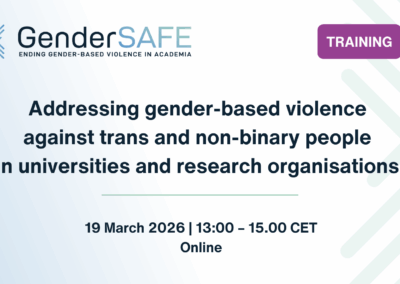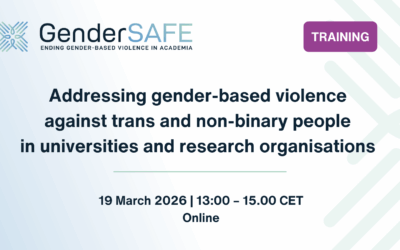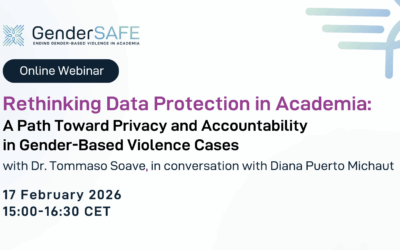When working to promote and implement effective responses to gender-based violence, change agents come across all sorts of resistances… This blog series aims to provide support by reframing arguments commonly encountered and help navigate challenging conversations with clarity, confidence and purpose. Drawing on the principles of strategic framing, this resource provides a better understanding and anticipation of common forms of resistance, as well as evidence-based, values-aligned messaging.
A common resistance to addressing gender-based violence is the argument that institutions should focus on real issues like education, not social issues like gender-based violence, but what does academic excellence mean if students and staff do not feel safe?
Data from the UniSAFE project show that gender-based violence in higher education correlates with elevated levels of psychological distress, absenteeism, drop-out and career disruption. Victims/survivors often report withdrawing from classes or supervisory relationships, avoiding academic spaces or delaying research deadlines due to the trauma they experience and avoidance. In many cases, these impacts go unacknowledged, eroding both individual potential and institutional performance. Higher education and research institutions that take proactive steps to address gender-based violence tend to perform better in areas such as student wellbeing, staff retention and international reputation. In contrast, institutions that ignore the issue risk disengagement, reputational damage and legal liability.
When higher education and research institutions treat gender-based violence as a marginal issue, they send a message that safety and dignity are not important. Wellbeing should be seen not only as a moral responsibility, but as a necessary condition for meaningful education.
“There is no academic excellence without safety and inclusion.”
Rather than viewing gender-based violence as “beyond the scope” of academic work, higher education and research institutions could recognise that preventing gender- based violence is integral to their commitments to wellbeing, equality, integrity and academic success. Student and staff wellbeing is increasingly recognised as a key factor in educational quality and institutional performance. Addressing gender-based violence is part of creating learning and working environments where all members can thrive.
- “Addressing gender-based violence is not a distraction from our mission; it is how we protect it.”
- “A safe and supportive environment is essential for learning, teaching and research to flourish.”
- “Violence is what disrupts education; not the efforts to prevent it.
Change agents can play a vital role in linking the prevention of gender-based violence to institutional values and performance. By framing safety and wellbeing as enablers of academic excellence, not separate from it, they help broaden what is considered a ‘core’ issue. They can engage leadership by connecting this work to strategic objectives like student success, research impact and international competitiveness, reinforcing that inclusion is not optional, but foundational.
Understanding the Resistance
Gender-based violence is not a peripheral or “social” issue, it is an institutional issue that directly affects the core functions of higher education: teaching, research and learning. When students or staff are subjected to harassment, abuse or unsafe environments, their ability to perform, participate and succeed is undermined. Preventing and addressing gender-based violence is essential to upholding academic freedom, excellence and equal access to education. This response may reflect a narrow definition of the university’s mission, or a discomfort with acknowledging institutional shortcomings. It can also stem from a desire to avoid conflict, resource allocation or reputational risk by framing gender-based violence as “external” to academic work.
Communicating with different stakeholders
- To leadership: Emphasise that prevention enhances the university’s academic outcomes and global reputation.
- To faculty/staff: Position gender-based violence as an issue that affects teaching environments, mentoring relationships and student retention.
- To students: Reinforce their right to learn in spaces free from fear, intimidation or harassment and invite their participation in shaping safer campuses.






